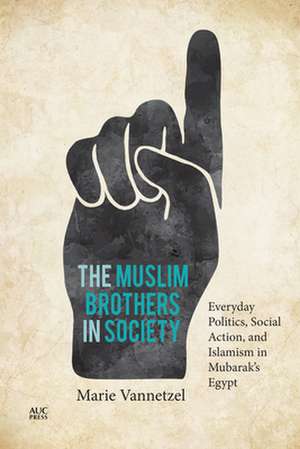The Muslim Brothers in Society: Everyday Politics, Social Action, and Islamism in Mubarak's Egypt
Autor Marie Vannetzel Traducere de David Treslilianen Limba Engleză Hardback – 31 dec 2020
Preț: 295.23 lei
Preț vechi: 312.86 lei
-6% Nou
Puncte Express: 443
Preț estimativ în valută:
56.49€ • 60.41$ • 47.10£
56.49€ • 60.41$ • 47.10£
Carte indisponibilă temporar
Doresc să fiu notificat când acest titlu va fi disponibil:
Se trimite...
Preluare comenzi: 021 569.72.76
Specificații
ISBN-13: 9789774169625
ISBN-10: 977416962X
Pagini: 312
Dimensiuni: 150 x 230 x 30 mm
Greutate: 0.59 kg
Editura: The American University in Cairo Press (UK)
Colecția The American University in Cairo Press
Locul publicării:United Kingdom
ISBN-10: 977416962X
Pagini: 312
Dimensiuni: 150 x 230 x 30 mm
Greutate: 0.59 kg
Editura: The American University in Cairo Press (UK)
Colecția The American University in Cairo Press
Locul publicării:United Kingdom
Caracteristici
This
book
shows
how
the
MB
operates
on
a
day-to-day
basis
in
society,
through
everyday
social
brokering,
constituent
relations,
and
youth
outreach
Notă biografică
Marie
Vannetzel
is
a
CNRS
fellow
at
the
Center
for
Economic,
Legal
and
Social
Studies
(CEDEJ)
in
Cairo,
and
currently
a
visiting
teacher
at
the
University
of
Cairo,
Faculty
of
Economics
and
Political
Science
(FESP).
She
received
her
PhD
with
distinction
from
Sciences
Po
Paris
in
2012.
Through
an
interdisciplinary
approach
combining
political
science,
sociology
and
anthropology,
she
has
been
studying
Egypt
through
the
past
fifteen
years.
Her
research
interest
focuses
on
the
politics
of
social
action
and
redistribution.
Cuprins
AcknowledgmentsIntroduction:
Encountering
the
Brothers
1.
(In)formal
Politics2.
Mobilizing
Disinterestedness3.
Banned
MPs4.
The
'Politics
of
Goodness'5.
The
Double-edged
Sword
of
Brotherhood6.
Goodness
in
Dire
StraitsNotesBibliographyIndex
Recenzii
Drawing
on
several
years
of
ethnographic
fieldwork,
Marie
Vannetzel
takes
us
into
the
streets
of
Mubarak-era
Cairo
to
explain
how
the
Muslim
Brotherhood
was
able
to
build
popular
support
in
a
context
of
semi-legality
and
how
this
support
was
lost
in
the
aftermath
of
the
25
January
Egyptian
Revolution.
Thoroughly
evidenced
and
elegantly
crafted,
Vannetzel's
acute
analysis
of
the
day-to-day
workings
of
Brotherhood
MPs
and
activists
provides
fresh
and
important
new
insights
into
the
rise
and
fall
of
the
movement.
A
rich
and
impressive
book.
This is a highly insightful study that is conducted with rigor and written with flair. It shows ethnographic research at its best by offering a new analysis of a deeply controversial topic and political organization. The book offers intricate social and political analysis to shed new light on the overlooked relationship between civic and religious identity in Muslim-populated countries.
Vannetzel delves deeply into the activities of the Muslim Brotherhood to show how the organization maneuvered as an illegal but tolerated organization in Mubarak's Egypt. Rather than operating in a "parallel Islamic sector," she argues, the group occupied an ambiguous space in which it was at once socially embedded and not clearly identifiable, all while maintaining a tight internal organizational structure. Her meticulous ethnographic research underscores how the organization's political success in the years leading up to the 2011 uprising lay in its depoliticization and its efforts to distinguish itself and its members as more ethical than their competitors.
This is a highly insightful study that is conducted with rigor and written with flair. It shows ethnographic research at its best by offering a new analysis of a deeply controversial topic and political organization. The book offers intricate social and political analysis to shed new light on the overlooked relationship between civic and religious identity in Muslim-populated countries.
Vannetzel delves deeply into the activities of the Muslim Brotherhood to show how the organization maneuvered as an illegal but tolerated organization in Mubarak's Egypt. Rather than operating in a "parallel Islamic sector," she argues, the group occupied an ambiguous space in which it was at once socially embedded and not clearly identifiable, all while maintaining a tight internal organizational structure. Her meticulous ethnographic research underscores how the organization's political success in the years leading up to the 2011 uprising lay in its depoliticization and its efforts to distinguish itself and its members as more ethical than their competitors.
